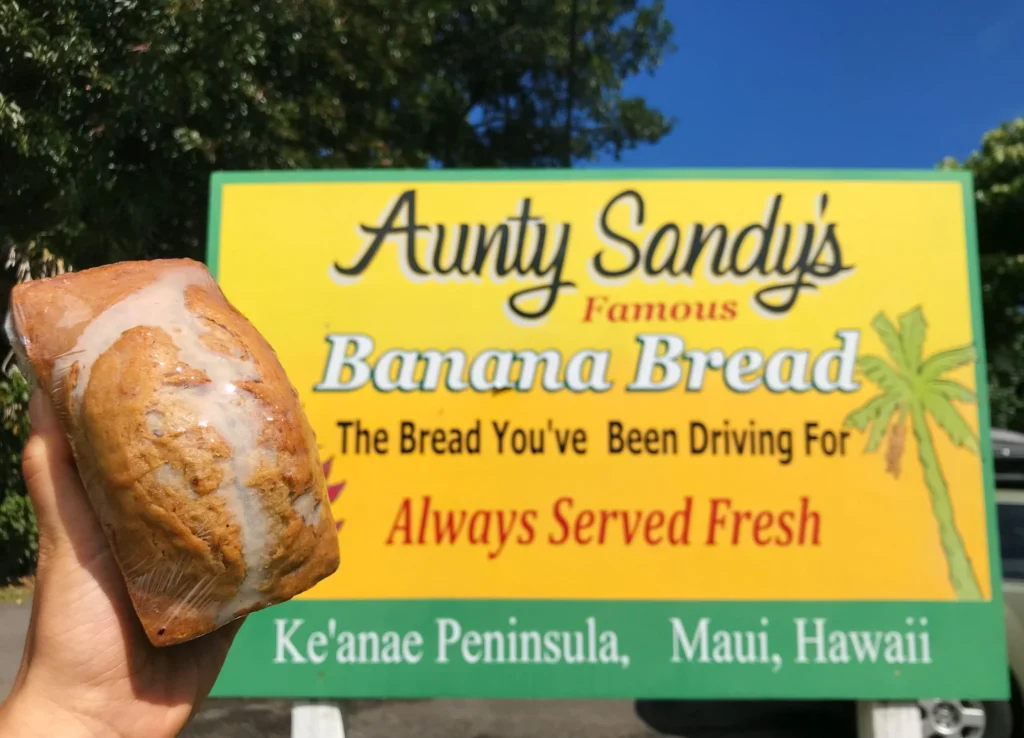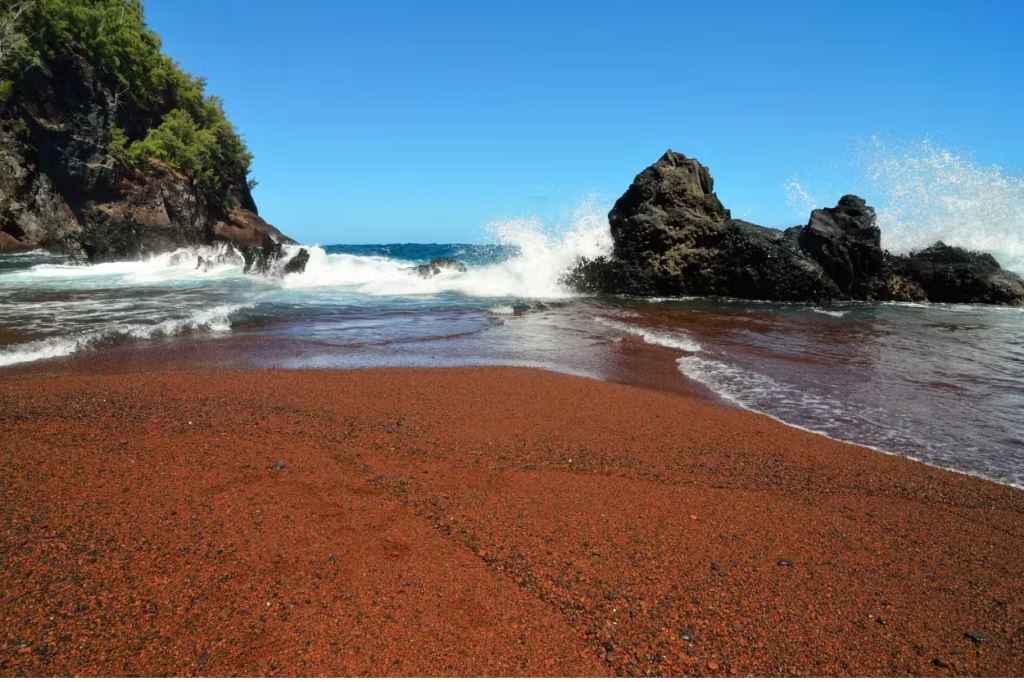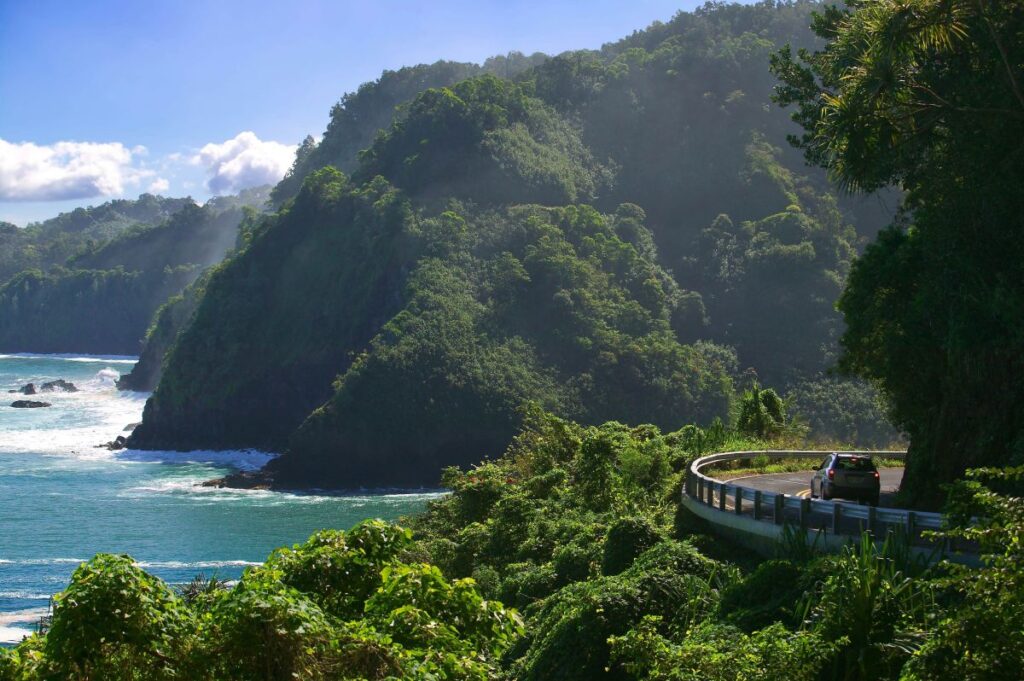Some stories don’t need embellishment. They write themselves through the rawness of the moment—the stress, the beauty, the kindness of strangers, and the unforgettable turns (both literal and emotional) along the way. This is one of those stories.
We left the Hilton Grand Wailea right after breakfast, full bellies and high hopes, packed into a dark blue Infiniti Q60 that looked sleek enough to handle the legendary Road to Hana. Our mission was simple: 1) See the red sand beach, and 2) Find Aunt Sandy’s famous banana bread hidden somewhere on the Ke’anae Peninsula.
I had noticed throughout the week that the Infiniti idled hard. I figured it was just the way the car was built—one of those high-performance engines that rumbled more than purred. I didn’t think much of it. I should have.
Now, if you’ve never driven the Road to Hana, let me paint you a picture. It’s one of the most breathtaking and treacherous roads in the United States—some say even the world. The road snakes along cliffs, through dense jungle, and past cascading waterfalls. It weaves between one-lane bridges and tight turns where one wrong move sends you tumbling into the angry ocean below. The Infiniti? Too wide for the road. Where others glided, I hugged the edge like my life depended on it—because it kinda did.
With no phone signal, our GPS was useless. The jungle cut off any digital connection to the outside world, so we went old-school: instincts, road signs, and prayers.
Colby, usually the quiet one, was clearly queasy from all the motion. He never complains, so when he cracked, “This might be the last drive of my life,” we all laughed a little harder than we should have. Sometimes humor is the best defense against fear.
Hours later, we emerged from the green tunnel of trees into a small residential area. I spotted a shack advertising banana bread. “I found Sandy’s!” I announced like I’d discovered buried treasure. We parked, stumbled out of the car, and stretched our legs like we’d just crossed a time zone.
The woman at the shack smiled warmly but shook her head. “This isn’t Sandy’s,” she said. “That’s down there.” She pointed toward the peninsula—maybe a mile south.
No problem, we thought. We’d hop back in the car and keep going.
Except… the car wouldn’t start.
Dead battery. No jumper cables. No cell service. And no clue what to do.
The shopkeeper saw our situation and ran back to her home—attached to the shop—and returned with her sister. Her sister had a handheld battery charger. It didn’t work. The Infiniti was more than dead—it was comatose. I began to wonder if Colby’s prediction was coming true.
Then, the woman smiled and said, “I called my cousin. He’s on his way.”
About twenty minutes later, a beat-up Tacoma rolled into the lot. Out stepped a young Hawaiian guy with shaggy hair, island calm, and a faint cloud of marijuana trailing behind him. He said nothing, just got to work. Minutes later, the Infiniti roared to life.
I pulled out a $20, trying to offer something—anything—for his kindness.
He shook his head, smiled, and said one word: “Aloha.”
And then he was gone.
I had heard about the aloha mindset before—that it was more than a greeting. That it meant love, compassion, peace, mercy, and a deep sense of connection. But this was the first time I truly felt it.
We drove the last mile and finally found Aunt Sandy’s banana bread. It was still warm. Gooey. Sweet in every sense of the word. Every bite felt like a reward.

Later we arrived at the red sand beach, Jocelyn, Mason, and Colby went to explore while I stayed in the car, idling—not just the engine, but my spirit too. That whole experience stayed with me. The stranger who helped us without hesitation. The feeling of being lost, then found. The aloha mindset isn’t just a cultural phrase. It’s a way of being I want to carry in my heart.

When life gets chaotic, when I’m tested, or when things feel out of my control, I think back to that moment… and I say, “Aloha.”
The ride back was quiet, calm. We called the rental company, explained the situation, and they told us to swap the car at the airport. When we got there, the woman at the return garage was clearly having a rough day.
“There are no cars left,” she said, arms crossed.
I explained everything. The battery. The jungle. The cousin with the Tacoma and the kindness. And then I pointed to the Cadillac in the next row.
“You didn’t pay for that class of vehicle,” she replied.
After some creative negotiation—and probably a little pity—she handed over the keys.
“Aloha,” I said with a smile as we drove off.
Because once you’ve truly experienced aloha, you never forget it.
